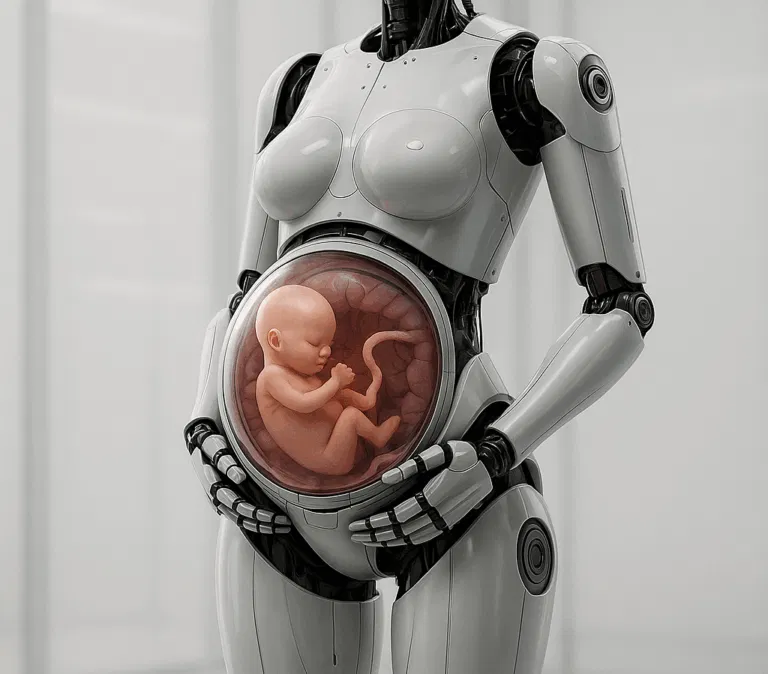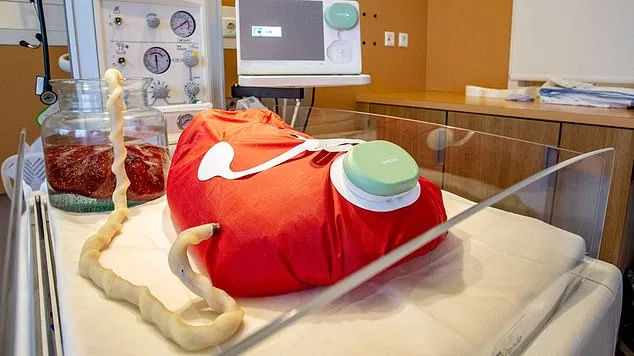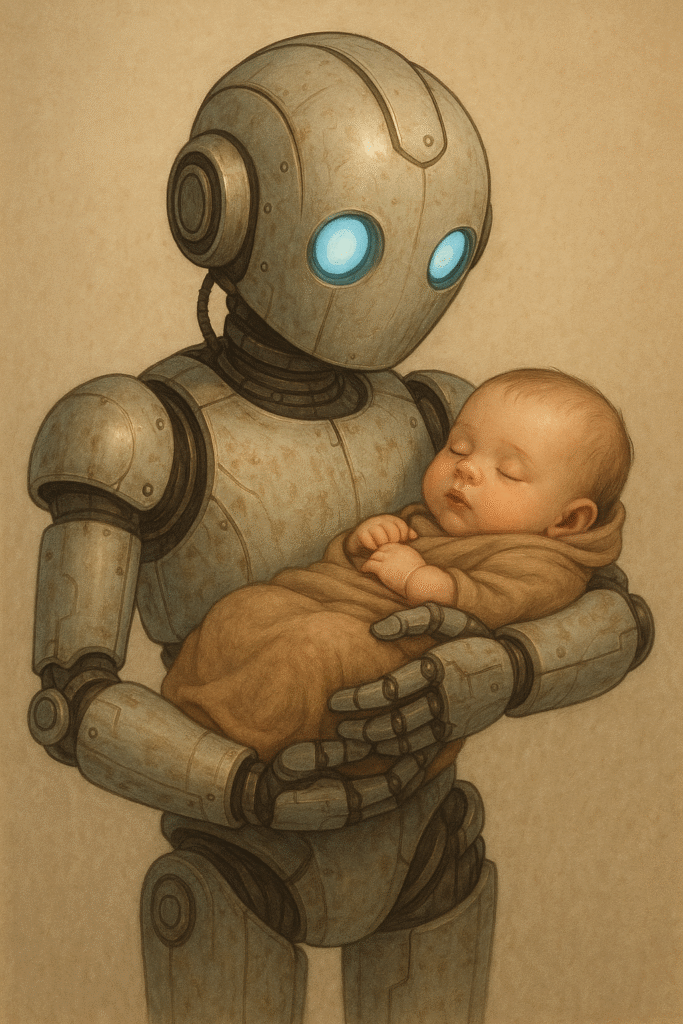Unbelievable: China is About to Launch the First ‘Pregnancy Robot’ to Carry a Baby
So, here’s the big news everyone’s talking about — pregnancy robot technology is blowing up online after China unveiled the world’s first humanoid robot that can actually carry and deliver a live baby. Yeah, you read that right. A robot that can give birth.
Scientists are calling it a groundbreaking innovation in AI healthcare, robotics engineering, and fertility technology. They say it could totally change how we think about human reproduction, IVF treatments, and even surrogacy options in the future.
But of course, not everyone’s cheering. A lot of people are freaking out about the ethical issues — like, should machines really be used for something as human as giving birth? Others worry it could affect human relationships, emotional bonding, and even the future of parenting.
Whether it’s the next big leap in medical AI or something we’re not ready for, one thing’s for sure — robot pregnancy tech just took the world by surprise, and the internet can’t stop talking about it.
So here’s where it gets even crazier — this pregnancy robot isn’t just a cool gadget. It’s being built with an artificial womb that actually nourishes a baby through a high-tech nutrient system, kinda like how a real human body works. Wild, right?
According to early reports, the robot might officially launch next year, and the expected price tag is around 100,000 yuan (that’s about $13,700 USD). Yeah, it’s pricey — but for something this groundbreaking, people are already saying it could be the next big thing in AI and reproductive technology.
Experts are calling it a luxury innovation in AI healthcare, fertility research, and robotic engineering — a product that’s not just futuristic but also super controversial. It’s already trending across tech news, bioengineering forums, and social media, with people debating if this is genius science or a step too far.
So here’s where it gets even more fascinating — the whole project is being led by Dr. Zhang Qifeng, the founder of Kaiwa Technology, and honestly, his vision sounds straight out of a sci-fi movie. Unlike your typical baby incubator, Dr. Zhang wants to create a humanoid robot that doesn’t just nurture a baby but actually simulates the entire pregnancy process, from conception to birth.
He believes artificial womb technology has now hit what he calls a “mature stage.” The next big move? Integrating this advanced system right into the robot’s abdomen, so humans and machines could literally work together to make pregnancy happen outside the human body. Crazy, right?
But even Dr. Zhang admits this tech isn’t without its challenges. He’s open about the fact that legal and ethical concerns are inevitable. His team has already held forums with Guangdong authorities and submitted policy proposals to figure out how to handle AI ethics, medical regulations, and reproductive rights around this invention.
Still, tons of big questions are hanging in the air — like how fertilization would actually happen, or how embryos could be safely implanted into an artificial womb. And that’s exactly what’s making the world so curious — and a little nervous — about what this tech could mean for the future of childbirth, AI in healthcare, and even the definition of human life itself.

The big reveal happened during an interview on Douyin — China’s version of TikTok — and wow, it spread like wildfire. Within hours, the video went viral, flooding social media with arguments, debates, and hot takes.
A lot of people called the idea unnatural, saying it could mess with human values, morality, and even the future role of mothers in society. Some worried that if a robot gives birth, it could destroy the deep emotional bond between mother and child, something no machine can truly replace. Others raised very real questions — like where would the eggs come from, and how exactly would they be used or stored?
But not everyone’s against it. A bunch of supporters actually see this as a life-saving innovation. They point out that for women who face serious health risks during pregnancy, this artificial womb technology could be a total game-changer. It could reduce suffering, prevent complications, and maybe even save lives.
So yeah, while some see it as crossing a moral line, others see it as the future of reproductive healthcare — a breakthrough that could reshape fertility science, AI healthcare, and what it even means to “give birth.”
One online comment noted that many families spend large sums on artificial insemination without success, and the pregnancy robot could be a breakthrough for them.
This isn’t the first time science has tried to create life outside the human womb. A few years back, researchers actually managed to keep premature lambs alive for weeks inside something called a biobag — basically an artificial womb that provided oxygen, nutrients, and even a layer of amniotic fluid, just like a real one. The results were wild — after about 28 days, those lambs not only survived but also grew normally, gained weight, and developed just like they would have in a natural womb.
Advertisement – Continue Reading Below

But here’s the twist — while the biobag acted more like a super-advanced incubator, this new pregnancy robot takes things to a whole new level. It’s designed to carry a fetus from conception to birth, something that honestly sounds like science fiction, but researchers say could become real within just a few years.
Of course, not everyone’s cheering. Opposition to artificial womb technology has been around since the 1970s, especially from feminist thinkers who worry it could undermine women’s roles in society. The famous writer Andrea Dworkin once called artificial wombs “the possible end of women,” asking whether men would still value women if natural pregnancy became unnecessary. Pretty deep question, right?
Even modern experts share some of those concerns. In 2022, researchers at The Children’s Hospital of Philadelphia published a paper warning that artificial wombs might devalue pregnancy and strip away the emotional meaning and fulfillment many women find in carrying a child. Their biggest fear? That we might start turning human experiences into machine-controlled processes, blurring the line between technology and humanity.
Despite all the buzz and controversy, public opinion is seriously split. A recent survey showed that around 42% of young adults between 18 and 24 actually support the idea of growing a baby entirely outside the human body. That’s a huge sign that Gen Z and younger generations might be more open to AI and reproductive technology changing the way childbirth works.

This whole concept isn’t new to pop culture either. The 2023 movie The Pod Generation imagined a futuristic world where couples use detachable artificial wombs, or “pods,” to share pregnancy equally. Sure, it’s fiction — but it touches on the exact same questions people are asking now: how far should technology go in replacing natural processes, and what happens when machines start taking over human experiences?
In China, supporters say the pregnancy robot could be a real answer to the country’s growing infertility crisis. Stats show that infertility rates have jumped from 11.9% in 2007 to 18% in 2020, which is pretty alarming. Some local governments have already started covering IVF treatments under health insurance plans, trying to help couples conceive. The AI pregnancy robot could become another lifeline for families struggling with fertility issues, offering a new hope through advanced artificial womb technology.
Still, not everyone’s ready for it. Critics argue that even if the tech actually works, society might not be emotionally or culturally prepared. The pregnancy robot doesn’t just challenge biology — it shakes up tradition, identity, and even the definition of parenthood. It raises deep questions about the value of maternal bonds, human connection, and how society would view children born through artificial wombs.
The debate around the pregnancy robot is nowhere near slowing down. Some people see it as a ray of hope — a breakthrough that could help millions struggling with infertility and reduce the health risks of pregnancy. For them, this kind of AI-powered reproductive technology could mean safer childbirth, fewer complications, and new possibilities for families who thought parenthood wasn’t an option.
But others see the exact opposite. To them, this isn’t progress — it’s a warning. They fear it’s a step toward disconnecting humanity from one of its most natural and emotional experiences: giving birth. Critics argue that no matter how advanced artificial womb technology gets, it can’t replace the emotional bond between mother and child or the human experience that comes with it.
For now, the pregnancy robot is still just a prototype, not a full reality — but the conversation it’s sparked is massive. It’s pushing society to think hard about where we draw the line between science and ethics, technology and emotion, innovation and identity. One thing’s for sure — this debate is going to shape the future of AI in healthcare, family life, and human connection for decades to come.
Did you like this article? Follow us on Google News

